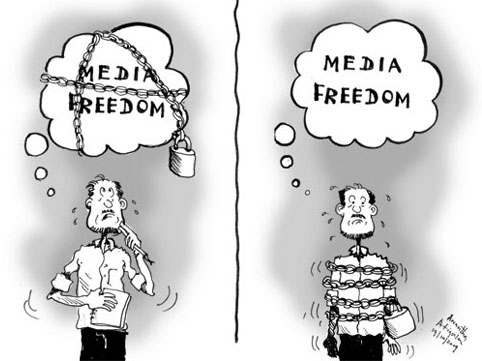| Online: | |
| Visits: | |
| Stories: |

| Story Views | |
| Now: | |
| Last Hour: | |
| Last 24 Hours: | |
| Total: | |
Media Freedom and Plurality is Struggling in Central & Eastern Europe

via Sites at Penn State.
Over a quarter of a century since the collapse of the Soviet Union, the scars of central and eastern Europe’s post-communist legacy are still visible.
Lacking the institutional infrastructure and regulatory oversight, the collapse of communism in the USSR created a void across the former Soviet bloc. This void offered fertile ground for wealthy individuals and institutions to exploit the absence of effective regulatory oversight and plunder the countries’ resources.
This “rise of the oligarchs” in Russia itself is well documented, with the likes of oil-tycoon turned Chelsea football club owner Roman Abramovich, and media tycoon Boris Berezovsky etched into the public’s minds. Less well known, however, is the similar exploitation that took place in central and eastern Europe and other former Soviet states, such as Romania and Bulgaria.
The lure of European Union membership and the introduction of reforms to ensure effective free-market oversight has done much to mitigate the rise and influence of oligarchs in Eastern Europe, but the media, unlike other sectors, has survived relatively unscathed from the reform agenda. The absence of effective media pluralism is still indicative across a number of central & eastern European countries.
In 2013, the European Parliament earmarked a budget for a pilot program to assess the risks to media pluralism in various member states. Responsibility for carrying out the ‘Media Pluralism Monitor’ (MPM) was subsequently awarded to the Centre for Media Pluralism and Media Freedom (CMPF), which selected Belgium, Bulgaria, Denmark, Estonia, France, Greece, Hungary, Italy and the UK as test cases for the pilot study.
The study explored a range of different aspects of the media, including the pluralism of media ownership and control and the level of political interference in the media market.When assessing regulatory safeguards for fair, balanced and impartial political reporting in television broadcast media, Bulgaria and Hungary were both deemed to be “high-risk.”When examining regulatory safeguards against high concentration of ownership or control in the media, Hungary was the only country to be deemed to be high-risk.Most concerning was the study’s assessment of editorial independence, where both Hungary and Italy were deemed to be at high risk of editorial interference.
A separate study by the Centre for Media Transparency (CMT), titled: “the men who bit the (watch) dogs”, looks specifically at media ownership in Romania. More detailed than the CMPF study, the CMT report explores some of the key individuals involved in shaping Romania’s media industry in the wake of the country’s independence from Russia.
Ronald Lauder, former US ambassador to Austria and son of the cosmetics tycoon Estée Lauder, is particularly notable. Quick to identify the significant opportunities presented by the nascent media industry in eastern Europe, in 1994 Lauder founded the Central Media Enterprise (CME). By 1997, the news and entertainment company owned TV stations in Slovenia, Romania, Slovakia and Ukraine.
Today, CME has operations in six central and eastern European markets with 34 television channels broadcasting to approximately 50 million people. Often, to gain access to domestic markets, CME was required to engage with local representatives. Access to the Romanian market came via Adrian Sârbu, a former media affairs minister in Romania’s first post-communist government.
Both Lauder and Sârbu have subsequently become subject to intense criticism. Likened to eastern Europe’s answer to Rupert Murdoch, Lauder was associated with nefarious local business partners in Ukraine, whom the FBI and European law enforcement agencies suspected of having ties to Russian organized crime. These connections culminated with Lauder facing a lawsuit seeking $750 million in damages filed by rival broadcaster Perekhid Media Enterprises Ltd. Then, in February 2014, Sârbu was charged with tax evasion, money laundering and embezzlement. Mired in scandal, Lauder resigned from the CME board in March 2014, while Sârbu sold his stake in the company later the same year. Time Warner subsequently bought pro TV.
In February this year, Sârbu was detained for 30 days after being charged with tax evasion, money laundering and embezzlement. He has since been released while awaiting trial. Sârbu’s arrest has elevated him to the esteemed ranks of Romania’s other leading media tycoons: Dan Voiculescu, Sorin Ovidiu Vântu and Dinu Patriciu—all of whom are currently under criminal investigation.
Unfortunately, the story of the Romanian media industry’s development is not unique. Instead, it is indicative of a broader trend of both domestic and foreign capital exploiting the regulatory and institutional vacuum left by the collapse of the Soviet Union. Alarmingly though, the European Union appears to be waking up only now to the implications this threat poses to the stability of the democratic process in these countries.
Despite the majority of the former eastern bloc joining the EU in 2004 (with Romania and Bulgaria joining three years later), it wasn’t until 2013 that the EU began allocating funding for the establishment of the Media Pluralism Monitor, which has yet to fully document and assess the degree of media plurality in the majority of former Eastern bloc members.
A free press is a core component to the effective functioning of any democratic country. If the EU is to continue to act as an institution committed to promoting democracy and freedom of expression throughout its member states then it must be more rigorous in assessing threats and challenges to these core values.
Source: http://foreignpolicyblogs.com/2015/11/16/media-freedom-and-plurality-is-struggling-in-central-eastern-europe/



